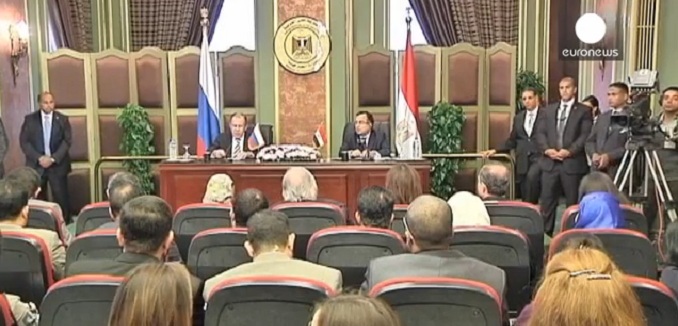The U.S. has in the past few decades enjoyed enormous benefits from close military-to-military ties with Cairo. Among other advantages, U.S. forces received preferential overflight rights and preferential access to the Suez Canal, both critical to U.S. efforts to move assets throughout the region. More broadly, ties between the U.S. and Egypt had prevented geopolitical rivals from encroaching on the U.S.’s interests in the region.
The Obama administration began distancing itself from Cairo last July after the Egyptian army, responding to unprecedented anti-government protests, overthrow the Muslim Brotherhood-linked government of then-president Mohammed Morsi. Washington among other things froze parts of the U.S.’s aid package to Egypt and its military, long considered a cornerstone of the bilateral relationship.
Washington’s decision had been blasted by analysts as not only unlikely to secure substantive results – Egypt’s generals view their struggle with the Muslim Brotherhood as an existential one, and it is difficult to imagine how they could reverse their ongoing decapitation campaign against the Islamist group’s leadership – but as geopolitically unwise. Earlier in November Tom Nichols and John R. Schindler, foreign policy scholars who emphasize that they rarely agree on foreign policy prescriptions, bluntly criticized the Obama administration for undermining “nearly seven decades” of bipartisan American efforts aimed at “limiting Moscow’s influence” in the Middle East.
Today Sergey Chemezov, the head of Russia’s state industrial holding company Rostec, went far in confirming that Nichols and Schindler’s fears were well-placed:
Chemezov’s comments came in the wake of a visit to Cairo last week by Russian Foreign Minister Sergei Lavrov and Defence Minister Sergei Shoigu devoted to military and diplomatic ties. Chemezov told Russia’s state-run RIA Novosti news agency that “some contracts (with Egypt) have already been signed — particularly one concerning air defence systems.” But he later clarified… that while the deal’s framework had been agreed, the contract itself had not been signed because of questions about where Egypt was going to secure the funding.
The Washington Post was already last week describing strategic changes in Egypt’s were more strategic dimensions to Cairo’s moves:
Egypt edged further away from its traditional place within the U.S. sphere of influence Thursday, hosting Russia’s foreign and defense ministers in the highest-level talks between the two countries in years. The visit, which included discussions on strengthening military ties and diplomatic efforts on Syria, challenged the U.S. position as Egypt’s primary benefactor and was seen as a diplomatic swipe at Cairo’s increasingly estranged Western ally.
[Photo: euronews / YouTube]




